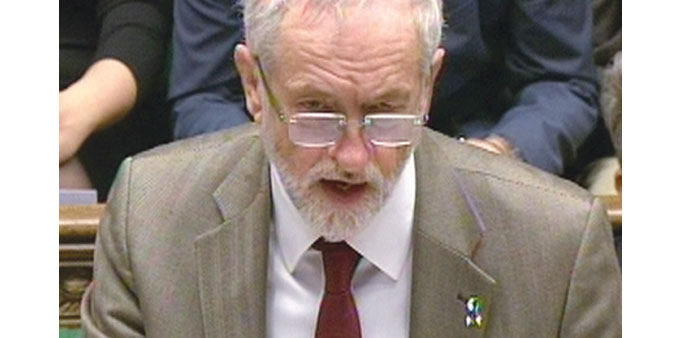Jeremy Corbyn may allow a free vote on Syria to avoid shadow cabinet resignations.
By Nicholas Watt
& Patrick Wintour
Guardian News & Media
Jeremy Corbyn and the shadow foreign secretary, Hilary Benn, have adopted sharply opposing views on UK military action against Islamic State, hours after David Cameron argued it was time to extend bombing to Syria.
The Labour leader faced dissent in the shadow cabinet yesterday, with reports that most of the party’s front bench were considering supporting the prime minister when the House of Commons votes on airstrikes against the Islamic State in Syria.
Corbyn wrote to his MPs on Thursday saying Cameron had failed earlier in the day to explain how an aerial campaign would protect UK security, setting up an intense debate in the party before an expected Commons vote next week to broaden RAF airstrikes from Iraq to Syria.“I do not believe the prime minister’s current proposal for airstrikes in Syria will protect our security and therefore cannot support it,” Corbyn wrote.
The letter was met with surprise among the most senior Labour MPs, who were believed to have agreed to spend the weekend sounding out constituents on the issue before presenting their position next week.
Emily Thornberry, shadow employment minister, said there was a “brutally honest” debate within the party and accepted that there would be a rebellion if a whip against airstrikes were imposed.
“I think that we have all agreed on a process, and the process is that there was a shadow cabinet meeting yesterday, we are then to go back to our constituents and ask them what they think,” Thornberry told BBC Radio 4’s Today programme yesterday.
“We have an open debate, and a brutally honest debate, going on within the Labour party,” the shadow employment minister added. “I think there will always be divisions within the political parties – the Conservatives will have their divisions too.
“When it comes to an issue of war, it is something that people think very profoundly about. We do usually act collectively, but I think on issues like this there are times when people cannot stick to a whip which is imposed.”
Corbyn’s letter set the leader at odds with Benn, who had earlier told a meeting of the shadow cabinet that the arguments in favour of extending the airstrikes were “compelling”.
The shadow foreign secretary, who believes that the prime minister has fulfilled the conditions laid down in a motion passed at the Labour conference on Syria, also contradicted Corbyn in public.
Benn told the BBC: “We have heard compelling arguments both because of the threat to the United Kingdom and also because we are right to have been taking the action that we have in Iraq to support the Iraqi government in trying to repel the invasion from Isil (Isis).”
This weekend, Corbyn will seek to win the approval of the shadow cabinet to oppose an extension of the airstrikes. He is drawing up plans to reach over the heads of his frontbench with an appeal to a parliamentary Labour party meeting on Monday night, after winning the support of just four members of his shadow cabinet at a meeting on Thursday afternoon.
The Labour leader has pulled out of a planned visit yesterday to campaign in the Oldham West byelection in order to be in London to focus on building support for his position.
A spokeswoman for the Labour leader said: “Regrettably Jeremy Corbyn is not now visiting Oldham because matters to do with Syria mean he must return to London.”
The early skirmishes between Corbyn’s supporters and the once mainstream former ministers in the shadow cabinet came after the prime minister set out the case for an extension of the airstrikes. In a lengthy statement, Cameron said the UK was already facing the threat of mass casualties from Isis and argued that Britain could not outsource its security to allies.
The prime minister, who was formally responding to a report by the commons foreign affairs select committee, which had opposed the airstrikes, told MPs: “We have to hit these terrorists in their heartlands right now: and we must not shirk our responsibility for security, or hand it to others. Throughout our history, the United Kingdom has stood up to defend our values and our way of life. We can, and we must, do so again.”
Downing Street is planning to table a vote in the commons next week amid signs that the prime minister is assembling a majority.
In a sign that a Tory rebellion will be smaller than expected, the chairman of the foreign affairs select committee, Crispin Blunt, who rebelled in a vote on military action in August 2013, signalled his support for the airstrikes. No 10 remains nervous about Labour’s position but believes that enough MPs will defy Corbyn to neutralise any remaining Tory rebellion.
The French government took the unusual step of expressing the hope that the Royal Air Force “will soon be working side by side with their French counterparts” in taking military action in Syria.
In a sometimes emotional appeal, the French defence minister writes in the Guardian that UK military capabilities would “put additional and extreme pressure on the Isis terror network”. Jean-Yves Le Drian said he wanted the RAF “to take the fight to the very heart of Isis, defeating it and making our countries and peoples safer”.

